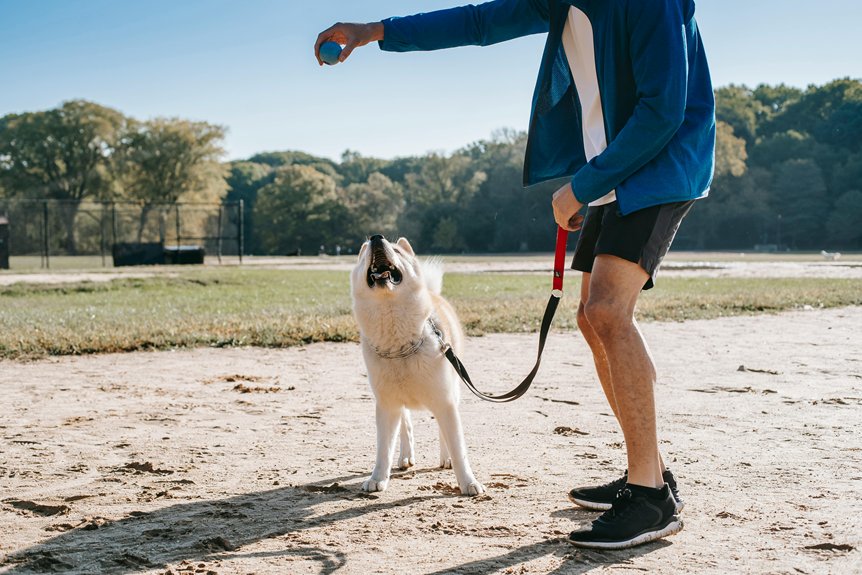
When you’re choosing a dog, health matters more than you might think. Certain breeds are known for having fewer genetic issues, which can lead to happier, longer lives. If you’re curious about which breeds stand out as the healthiest companions, you might be surprised by the options. Let’s explore some top choices and what makes them resilient, ensuring you find the perfect pup for your lifestyle and peace of mind.
Understanding Dog Health: Why It Matters
When you think about bringing a dog into your life, understanding their health is essential—not just for their well-being, but for yours too. A happy, healthy dog is more likely to be a loyal companion, enhancing your quality of life.
You’ll want to know about common health issues in different breeds, as awareness helps you make informed choices. Regular vet check-ups, a balanced diet, and proper exercise can drastically improve your dog’s lifespan and happiness. Additionally, incorporating supplements that promote balanced gut health can further support your dog’s overall well-being.
Plus, keeping them healthy reduces the stress of unexpected vet bills. By investing time in understanding your dog’s health, you’re fostering a strong bond that leads to a fulfilling relationship.
The Importance of Breed Selection
Choosing the right dog breed can make all the difference in ensuring a long and healthy companionship. When you select a breed known for fewer health problems, you’re investing in a happier future.
Different breeds come with distinct traits and potential health issues, so understanding these factors is essential. For example, some breeds are predisposed to certain genetic conditions, while others generally enjoy robust health.
It’s vital to take into account your lifestyle and the breed’s needs, too. Will you have time for regular exercise? Do you prefer a dog that’s more independent or one that craves companionship?
Top 5 Dog Breeds With Fewer Genetic Issues
Some dog breeds are like the superheroes of the canine world, boasting fewer genetic issues and a reputation for robust health.
If you’re looking for a loyal companion, consider the Basenji, known for its minimal hereditary health problems. The Australian Cattle Dog is also a top contender, with a sturdy frame and resilience.
Then there’s the Shiba Inu, an independent breed that typically enjoys good health. Don’t overlook the American Bulldog; they’re not just tough but also have fewer genetic concerns.
Finally, the mixed breed often combines the strengths of various breeds, leading to fewer health issues. Choosing one of these breeds can enhance your chances of a long, healthy life together!
The Role of Responsible Breeding
While it might be tempting to focus solely on a dog’s appearance or temperament, responsible breeding plays an essential role in ensuring the health and longevity of your furry friend.
When breeders prioritize health testing and genetic screening, they can reduce the risk of inherited diseases. This means you’re more likely to choose a pup with fewer health issues down the road.
Additionally, responsible breeders carefully select mating pairs based on their temperament and behavior, creating well-rounded companions.
By supporting breeders who adhere to these practices, you’re investing in a healthier dog.
Lifespan and Overall Health: Key Factors
When taking into account a dog’s lifespan and overall health, several key factors come into play that can greatly impact your pet’s quality of life.
First, genetics play a significant role; certain breeds are predisposed to health issues that can shorten their lifespan.
Second, size matters—generally, smaller breeds tend to live longer than larger ones.
Additionally, the dog’s environment and lifestyle, including socialization and mental stimulation, can influence their overall health.
Regular veterinary check-ups help catch potential issues early.
You’ll also want to evaluate the breed’s activity level and adaptability to your home.
Nutrition and Exercise for a Healthy Dog
To keep your dog healthy and happy, focusing on nutrition and exercise is essential. Start with a balanced diet rich in high-quality protein, healthy fats, and essential vitamins. Avoid fillers and artificial additives; instead, opt for whole ingredients that fuel your pup’s energy needs.
Remember, portion control is key—keeping an eye on their weight prevents obesity-related health issues.
Exercise is equally important. Regular walks, playtime, and mental stimulation keep your dog fit and engaged. Tailor activities to your dog’s breed and age, ensuring they get the right amount of physical activity each day.
A mix of cardio and strength-building exercises will help maintain their overall health. With the right nutrition and exercise, you’re setting your furry friend up for a vibrant life!
Regular Veterinary Care: A Must for Longevity
Regular veterinary care is essential for ensuring your dog lives a long, healthy life.
Regular check-ups help spot potential health issues before they become serious, giving your furry friend the best chance at a longer life. Vaccinations protect against common diseases, while dental cleanings prevent oral problems that can affect overall health.
By establishing a relationship with your vet, you’ll stay informed about your dog’s specific needs as they age.
Don’t forget about preventative care, like heartworm tests and flea control, which are vital for your dog’s well-being.
Plus, having those annual visits helps you stay on top of any lifestyle adjustments needed for your pup.
Recognizing Common Health Concerns
Being aware of common health concerns can greatly impact your dog’s well-being and longevity. Certain breeds are prone to specific issues, like hip dysplasia in larger dogs or respiratory problems in brachycephalic breeds.
Keep an eye out for signs of discomfort, such as limping, excessive panting, or changes in appetite. Regularly check your dog’s skin for lumps, rashes, or parasites.
Dental health is another critical area; periodontal disease can lead to serious complications if ignored. Don’t forget about weight management—obesity can exacerbate many health problems.
Making the Right Choice for Your Lifestyle
How do you envision your ideal life with a dog? Consider your daily routine and activities. If you lead a busy lifestyle, a low-energy breed like the Bulldog might fit perfectly.
For active individuals, breeds like the Labrador Retriever or Australian Shepherd thrive in energetic environments. Think about your living space too; smaller breeds, such as the French Bulldog, adapt well to apartments.
Also, consider your family’s needs. Some breeds are more tolerant of kids, while others may prefer a quieter home.
Finally, don’t forget about grooming and maintenance. Breeds with minimal health issues, like the Shiba Inu, often require less care.
Ultimately, choose a dog that complements your lifestyle, ensuring a happy, healthy companionship for years to come.






